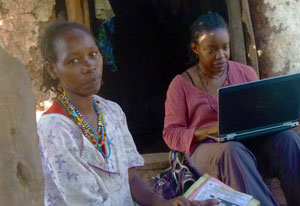Profile: Fogarty Fellow Dr Rachel T Idowu learns skills useful for global health career
January / February 2014 | Volume 13, Issue 1
By Arthur Allen
For Dr. Rachel T. Idowu, her Fogarty fellowship in Africa helped her gain the skills needed to conduct research in low-income settings - skills that were immediately useful when she finished the program and began work at the U.S. Centers for Disease Control and Prevention (CDC).
As a participant in the Fogarty Global Health Program for Fellows and Scholars, Idowu worked on a project in Kenya designed to evaluate surgical services at the district level by looking at basic outcomes. She collected data with an eye toward helping hospital officials design better decision-making systems.
Limited resources and a shortage of surgeons in countries like Kenya mean that patients can face weeks in hospital beds awaiting procedures, which they must pay for in advance. In collaboration with a colleague at Vanderbilt University, Idowu designed an Android-based study questionnaire compatible with an open-source app for smartphones. She hired two Kenyan nurses and trained them to use smartphones to collect data at the study hospitals.

Photo courtesy of Dr. Rachel T. Idowu
As a Fogarty Scholar Dr. Idowu worked on a project
in Kenya designed to evaluate surgical services at
the district level by looking at basic outcomes.
Getting consent and navigating the ethical review process was a challenge. "There were a lot of people dynamics; you're trying to establish a relationship of trust with strangers and work out a plan for something you think will be of benefit to their country," said Idowu. "You learn to structure your downtime to get other things done while you're waiting for approvals."
Idowu has not had much time to digest her findings. She got off a plane from Nairobi in June 2012 and went to work the next month as an Epidemic Intelligence Service Officer in the International Emergency and Refugee Health Branch of the CDC's Center for Global Health. Her Fogarty experience has been extremely useful at the CDC, where she quickly became involved in a number of projects. "The time I spent living and working in Kenya has been very valuable to the job I have now," said Idowu.
Since joining the CDC, Idowu has helped establish a uniform public health data reporting system in Jordan for health partners administering care inside a large Syrian refugee camp. In South Sudan, her team evaluated the country's surveillance system for communicable diseases. And in Chad, she was part of a CDC team examining health outcomes for babies at a Sudanese refugee camp, at the request of the U.N. High Commission for Refugees.
These assignments have often involved interacting with health ministries and administrators at regional and local levels, so her work in Kenya was very relevant, Idowu noted. "The Fogarty experience gave me a level of comfort in thinking about which health providers are trained to deliver care and how they can improve the work they do." She has also used the mobile technology software systems she learned about in Kenya.
The Fogarty-sponsored project was an early example of using mobile data collection tools in combination with a research data management system to accelerate the analysis of health services delivery data in a low-resource setting, observed mentor Dr. Eric Manders, now also at CDC's Center for Global Health. Manders was previously a bioinformatics expert at Vanderbilt's Institute for Global Health, where he assisted Idowu in designing her Fogarty study.
Idowu's decision to embed the data management platform in a respected Kenyan research organization exposed her host country co-investigators to the methodology, building local capacity, according to Manders. "It has been gratifying to observe that in her current role at the CDC, she has transferred her experience with this technology to larger, more complex studies, conducted in remote settings of great humanitarian need."
More Information
To view Adobe PDF files,
download current, free accessible plug-ins from Adobe's website.